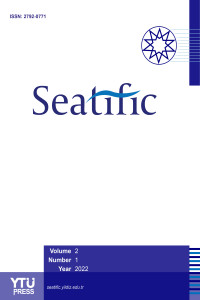Abstract
Newcastle University [UNEW] has enhanced the test section of their existing water channel facility. The new measurement section is utilized to measure pressure drop (and hence frictional drag) across a standard flat test panel (length=0.6 m; width=0.22 m). The panel can be tested as cleanly coated as well as exposed to light biofilm growth. Based on measured pressure gradients, the skin friction coefficients of these surfaces are calculated and compared with other well-established methods (i.e., measuring the boundary layer of similar surfaces using a [LDV] system in UNEW’s Emerson Cavitation Tunnel [ECT], to evaluate the pressure drop methodology. This paper presents a design and calibration of a flow cell to investigate skin-friction of three different surfaces in a fully developed turbulent flow.
Keywords
Supporting Institution
The research leading to these results has received funding from the European Union’s Seventh Framework Programme (FP7-OCEAN-2013)
Project Number
Project Seafront under Grand Agreement No: 614034.
References
- Banerjee, I., Pangule, R. C., & Kane, R. S. (2011). Antifouling coatings: Recent developments in the design of surfaces that prevent fouling by proteins, bacteria, and marine organisms. Advanced Materials, 23(6), 690–718.
- Candries, M. (2001). Drag, boundary layer and roughness characteristics of marine surfaces coated with antifoulings [Unpublished Doctoral Dissertation]. Newcastle University.
- Dean, R. B. (1978). Reynolds number dependence of skin friction and other bulk flow variables in two-dimensional rectangular duct flow. Journal of Fluids Engineering, 100(2), 215–223.
- Harvald, S. A. (1983). Resistance and propulsion of ships. John Wiley & Sons.
- Monty, J. P. (2005). Developments in smooth wall turbulent duct flows [Unpublished Doctoral Dissertation]. University of Melbourne, Department of Mechanical and Manufacturing Engineering.
- Nikuradse, J. (1933). Laws of flow in rough pipes. VDI Forschungsheft.
- Politis, G., Atlar, M., Kidd, B., & Stenson, P. (2013, September 7-8). A multipurpose flume for the evaluation of hull coatings. 3rd International Conference on Advanced Model Measurement Technology for the Maritimae Industry (AMT’13), Gdansk, Poland.
- Schultz, M. P., Bendick, J. A., Holm, E. R., & Hertel, W. M. (2011). Economic impact of biofouling on a naval surface ship. Biofouling, 27(1), 87–98.
- Townsin, R. L. (2003). The ship hull fouling penalty. Biofouling, 19(1), 9–15.
- Woods Hole Oceanographic Institution. (1952). Marine fouling and its prevention: Prepared for Bureau of Ships. George Banta Publishing Company.
- Zanoun, E., Nagib, S. H., & Durst, F. (2009). Refined cf relation for turbulent channels and consequences for high-Re experiments. Fluid Dynamics Research, 41(2), Article 021405.
Abstract
Project Number
Project Seafront under Grand Agreement No: 614034.
References
- Banerjee, I., Pangule, R. C., & Kane, R. S. (2011). Antifouling coatings: Recent developments in the design of surfaces that prevent fouling by proteins, bacteria, and marine organisms. Advanced Materials, 23(6), 690–718.
- Candries, M. (2001). Drag, boundary layer and roughness characteristics of marine surfaces coated with antifoulings [Unpublished Doctoral Dissertation]. Newcastle University.
- Dean, R. B. (1978). Reynolds number dependence of skin friction and other bulk flow variables in two-dimensional rectangular duct flow. Journal of Fluids Engineering, 100(2), 215–223.
- Harvald, S. A. (1983). Resistance and propulsion of ships. John Wiley & Sons.
- Monty, J. P. (2005). Developments in smooth wall turbulent duct flows [Unpublished Doctoral Dissertation]. University of Melbourne, Department of Mechanical and Manufacturing Engineering.
- Nikuradse, J. (1933). Laws of flow in rough pipes. VDI Forschungsheft.
- Politis, G., Atlar, M., Kidd, B., & Stenson, P. (2013, September 7-8). A multipurpose flume for the evaluation of hull coatings. 3rd International Conference on Advanced Model Measurement Technology for the Maritimae Industry (AMT’13), Gdansk, Poland.
- Schultz, M. P., Bendick, J. A., Holm, E. R., & Hertel, W. M. (2011). Economic impact of biofouling on a naval surface ship. Biofouling, 27(1), 87–98.
- Townsin, R. L. (2003). The ship hull fouling penalty. Biofouling, 19(1), 9–15.
- Woods Hole Oceanographic Institution. (1952). Marine fouling and its prevention: Prepared for Bureau of Ships. George Banta Publishing Company.
- Zanoun, E., Nagib, S. H., & Durst, F. (2009). Refined cf relation for turbulent channels and consequences for high-Re experiments. Fluid Dynamics Research, 41(2), Article 021405.
Details
| Primary Language | English |
|---|---|
| Subjects | Maritime Engineering (Other) |
| Journal Section | Research Article |
| Authors | |
| Project Number | Project Seafront under Grand Agreement No: 614034. |
| Publication Date | June 30, 2022 |
| Submission Date | February 9, 2022 |
| Published in Issue | Year 2022 Volume: 2 Issue: 1 |
Seatific Journal
Creative Commons Attribution-NonCommercial (CC BY-NC) 4.0 International License


